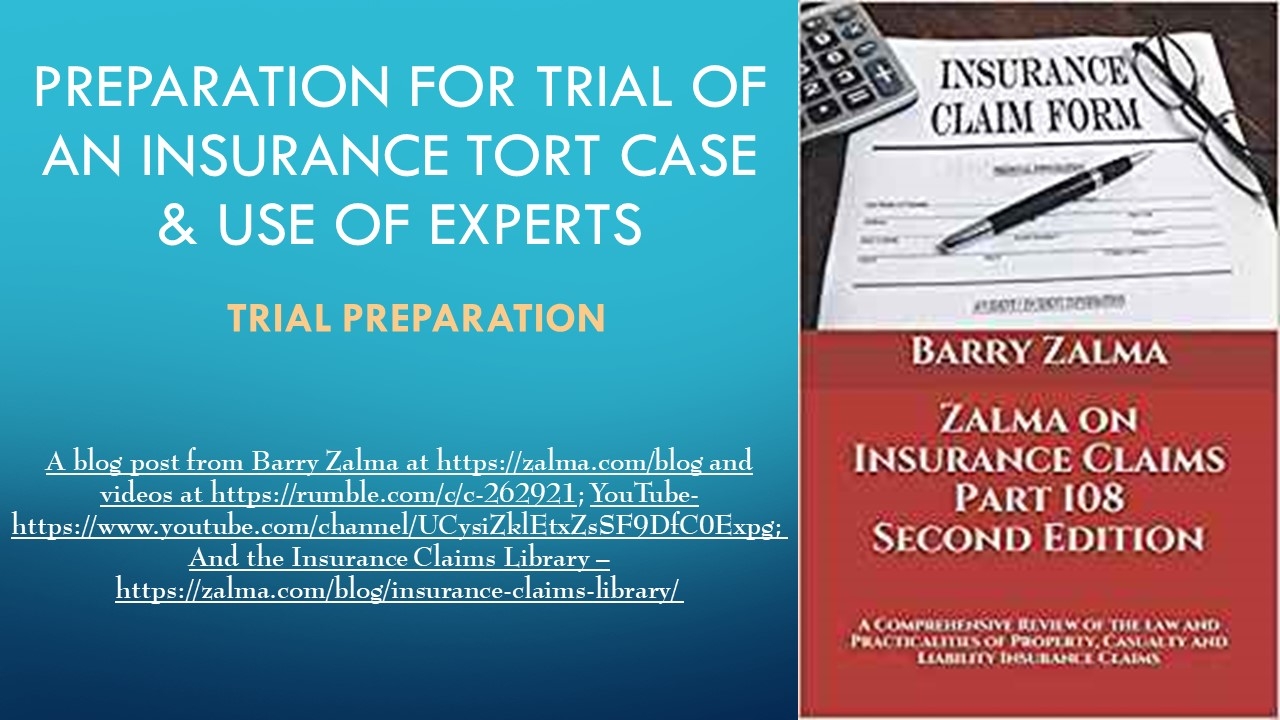-
News Feed
- EXPLORE
-
Pages
-
Groups
-
Events
-
Blogs
-
Marketplace
-
Offers
-
Jobs
-
Developers
Preparation for Trial of an Insurance Case and Use of Experts

Trial Preparation
Read the full article at https://www.linkedin.com/pulse/preparation-trial-insurance-tort-case-use-experts-zalma-esq-cfe and see the full video at https://rumble.com/viudyn-preparation-for-trial-of-an-insurance-tort-case-and-use-of-experts.html and at https://youtu.be/9jyobYfG3ks and at https://zalma.com/blog plus more than 3800 posts.
After completion of investigation, written discovery, oral depositions, and retention of necessary expert witnesses, the trial preparation part of the case begins.
The defense attorney’s response should include the settlement value, or range of values, he or she places on the case.
After reviewing the report, the adjuster should confer with the attorney to discuss strategy in depth. They should agree on the cost of a potential settlement versus that of an actual trial. If they decide that settlement should be attempted, the adjuster should give the attorney settlement authority within the agreed-upon range.
Use of Experts
The qualification and reliability requirements of Evidence Rule 702 are distinct. Because even a qualified expert is capable of rendering scientifically unreliable testimony, it is imperative for a trial court, as gatekeeper, to examine the principles and methodology that underlie an expert’s opinion. Ohio and federal rules require that the trial judge must assess whether any and all scientific testimony or evidence admitted is not only relevant, but also reliable. It is that determination that ensures that the testimony will be helpful to the trier of fact.
Even when there is ample evidence in the record to support a trial court’s decision that an expert is qualified and his or her testimony is reliable, it is left to the discretion of the trial judge whether the expert should be allowed to testify. Whenever an insurance coverage or insurance claims handling expert is called it is essential that a record be made at trial as to the expertise of the witness and that the expert will provide testimony that is truly expert and neither elementary nor simplistic and will help the jury or judge understand the custom and practice of the insurance claims industry which information is not within the knowledge or experience of a lay jury.
We are 100% funded for October.
Thanks to everyone who helped out. 🥰
Xephula monthly operating expenses for 2024 - Server: $143/month - Backup Software: $6/month - Object Storage: $6/month - SMTP Service: $10/month - Stripe Processing Fees: ~$10/month - Total: $175/month
- Art
- Causes
- Crafts
- Crime
- Dance
- Drinks
- Film
- Finance
- Fitness
- Food
- Games
- Gardening
- Health
- Home
- Literature
- Music
- Networking
- Paranormal
- Other
- Politics
- History
- News
- Party
- Science
- Religion
- Shopping
- Sports
- SyFy
- Politically Incorrect
- Philosophy
- Theater
- Technology
- Wellness



